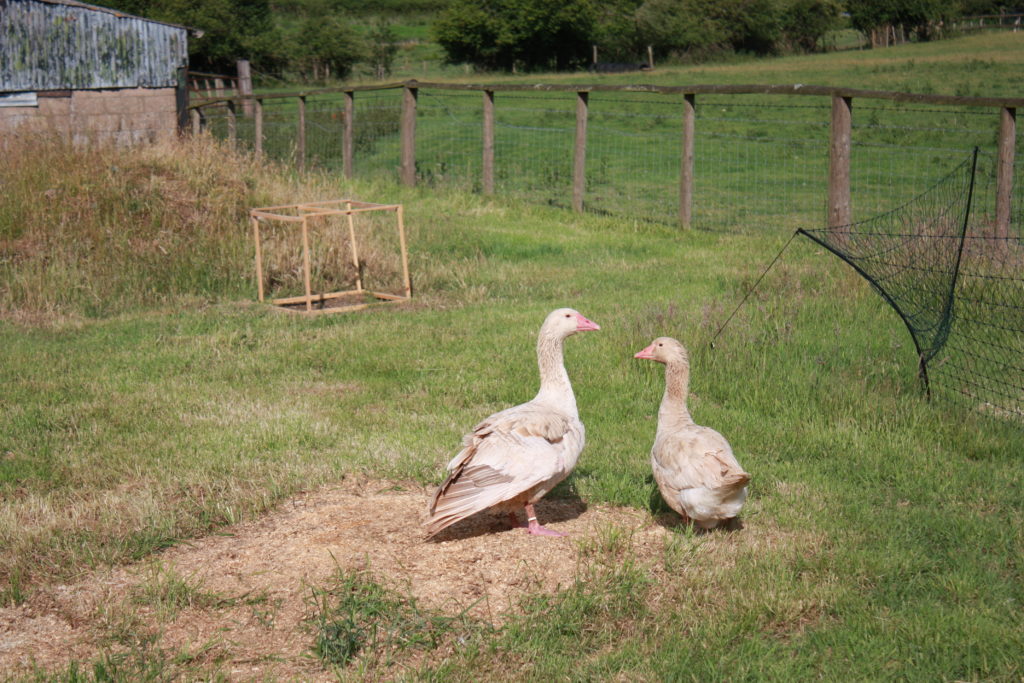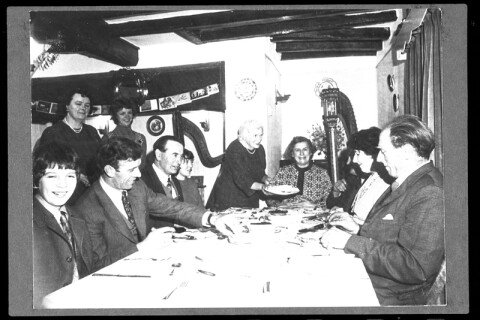Goose and Plygain: Welsh Christmas food traditions

Carwyn Graves
Christmas food traditions in Wales may now be virtually indistinguishable for most of us from norms across the British Isles, but until within living memory quite a different way of celebrating the festive period held sway here – one that was much more community-focused, and whose vestiges are still hanging on.
The Christmas Goose
Though by no means unique to Wales, the tradition of killing a goose for the Christmas dinner remained popular here into the 1980s in some parts, a good two hundred years after Christmas turkeys were first mentioned in Wales.
Geese were an integral part of many traditionally mixed farms’ household economies, with the large number of people who often shared Christmas dinner together creating a (nutritious) by-product in the from of goose blood.
This was used to make goose blood puddings widely across the country – a form of savoury black pudding good with bacon – with Montgomeryshire developing its own linked tradition of sweet gooseblood tarts.
With our own native breed of goose (the Brecon Buff) and some ecologists worried about goose overabundance, might there be a place for them on Welsh Christmas dinner plates again?

Plygain
One of Wales’ most distinctive Christmas traditions, plygain services are a form of unaccompanied, spontaneous carol service traditionally held in churches early on Christmas morning (with the name in Welsh implying ‘daybreak’).
These services were then followed by feasting and carousing, as an 1895 American traveller to Dolgellau recorded:
‘Prayers over, the singers begin again more carols, new singers, old carols in solos, duets, trios, choruses then silence in the audience, broken at appropriate pauses by the suppressed hum, of delight and approval, till between 8 and 9, hunger telling on the singers, the Plygain is over and the Bells strike out a round peal. The oatcakes in the Browas, the swig, the strong ale, the cakes, the cold meats are soon being ravenously devoured at Dr Williams’ and all his neighbours’ houses, far and wide, the young ones afterwards going to football and ball playing, the other ones criticising the carols till church time and dinner come round, when feasting finishes the day.’
In the early 20th century, there are numerous accounts of games, puddings and hams being shared after the Plygain service in rural villages while folk waited for the goose to roast.
And though much of the detail has now changed, the Christmas morning post-Plygain feast has mutated into a Plygain supper, still widely held straight after Plygain services across mid-Wales.

Community
Other Christmas and New Year (Calan) traditions in Wales, such as toffee making, singing Calennig and the Fari Lwyd, are also associated with food, and strikingly, all are very much community events – rather than being based on a conception of Christmas as a day for the family only.
As Minwel Tibbot recounts from her visits to mountainous areas of North Wales in the 1970s, where the tradition still existed of friends and neighbours being invited around after dark during the Christmas period to make toffee together, with much of the fun coming from banter around failure to pull and twist the hot toffee properly.
Similarly, in the older forms of the now resurrected tradition of taking the Mari Lwyd around a town or village, the singing and the horse themselves were merely precursors to the main event of sharing food and drink, as captured in the Swansea poet Vernon Watkins’ (died 1967) ‘Ballad of the Mari Lwyd’:
There were jumping sausages, roasting pies,
And long loaves in the bin,
And a stump of Caerphilly to rest our eyes,
And a barrel rolling in.
O a ham-bone high on a ceiling hook
And a goose with a golden skin,
And the roaring flames of the food you cook:
For God’s sake let us in.’
This is a Christmas without Santa in a materially poorer Wales that is now slipping from lived memory; but much of this sense of shared experience in the dead of winter appeals to me, and I daresay to many others. Nadolig Llawen!
This is part of a monthly series on Nation.Cymru on the diversity of Welsh food culture by Carwyn Graves. You can read the other installments of the series here.
Support our Nation today
For the price of a cup of coffee a month you can help us create an independent, not-for-profit, national news service for the people of Wales, by the people of Wales.





